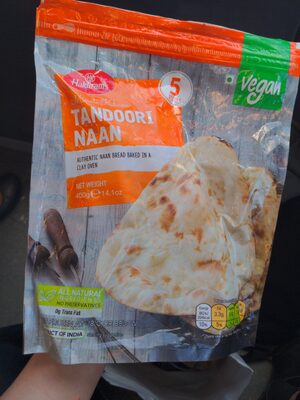
Barcode: 8904063210937
Tandoori naan
HALAL
📝 Reason: Tandoori naan contains standard vegetarian and vegan-friendly bakery ingredients. No Haram Ecodes (E120, E124, E354, E999) or meat derivatives are present. All additives like E500 are listed as Halal in the provided references. Based on provided data and Islamic jurisprudence (Quran 5:3), these ingredients are Halal unless evidence of Haram sourcing arises (IFANCA, foodchemadditives.com).
🏷️ Category: Plant Based Foods And Beverages, Plant Based Foods, Cereals And Potatoes, Breads, Flatbreads, Special Breads, Naans
📄 Certificates: Vegetarian, No Preservatives, Vegan, Vegetarisch, Vegan
Ingredients:
Details
Understanding the Halal Status of Tandoori Naan
Tandoori naan is not just a delicious flatbread; it also poses an important question regarding its Halal status. With a combination of simple ingredients, many are curious if this popular Indian bread meets Halal dietary guidelines. According to Islamic jurisprudence (Quran 5:3), a food is considered Halal unless there is evidence of Haram (prohibited) sourcing.
Ingredients Breakdown
The primary ingredients of Tandoori naan include:
- Wheat flour
- Water
- Refined sunflower oil
- Sugar
- Salt
- Baking powder (maize starch, raising agent – E500)
- Yeast
Wheat Flour
Wheat flour is a staple ingredient used widely in baking. As a plant-based carbohydrate, it poses no Halal concerns. Its source is purely botanical, making it fully acceptable in Halal diets. [Source]
Water
Water is essential for baking and has no Halal implications whatsoever. It’s considered pure and unadulterated in Islamic dietary laws, thus being a naturally acceptable ingredient. [Source]
Refined Sunflower Oil
This oil is derived from sunflower seeds and is free from animal-based constituents, ensuring it remains free of any Haram components. It is often used in baking due to its neutral flavor and health benefits. [Source]
Sugar
Sugar is typically derived from plant sources; however, care should be taken to ensure it has not been processed with animal bone char. While modern refining processes have largely eliminated this practice, always check sources if you have concerns. [Source]
Salt
A naturally occurring mineral, salt does not have any Haram or Halal implications, making it another safe ingredient in Tandoori naan. [Source]
Baking Powder (Maize Starch, Raising Agent – E500)
Baking powder is made from maize starch and contains E500 (Sodium Bicarbonate). Both components are Halal, with E500 widely accepted in Halal-approved lists. [Source] | [Source]
Yeast
Yeast plays a crucial role in the leavening process and is generally Halal unless cultivated on a Haram medium. Typically, in bread production, yeast is derived from acceptable sources, reaffirming its Halal status. [Source]
Final Thoughts on Tandoori Naan
In conclusion, Tandoori naan qualifies as Halal when considering its ingredients, which are free of any Haram elements or additives. With the presence of certifications such as vegetarian, vegan, and no preservatives, it becomes an ideal option for those adhering to Halal dietary needs. Whether you’re a fan of Indian cuisine or exploring new additions to your meals, Tandoori naan is a delicious and safe choice.
Enjoy your Tandoori naan with confidence, and remember that proper ingredient sourcing is key to ensuring compliance with Halal standards!
